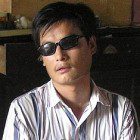14 May 2012 | China
UPDATE: Chen Guangcheng’s relatives have described beatings by local authorities since the activist fled house arrest last month. His brother, Chen Guangfu, father of Chen Kegui was reportedly detained for three days, during which time he was beaten and interrogated.
Chen Guangfu described his ordeal to Hong Kong-based magazine iSunAffairs.com, telling them he was hooded and taken away from his home shortly after Chen Guangcheng escaped. He said: “They put me on a chair, bound my feet with iron chains and locked my hands with handcuffs behind my back,” he said. “They pulled my hands upwards forcefully. Then they slapped me in the face.”
Chen Guangcheng condemned the “pattern of abuse” against his relatives.
The nephew of blind Chinese activist and “barefoot lawyer” Chen Guangcheng has been arrested on charges of attempted murder. Chen Kegui faces charges ranging from 10 years in prison to the death sentence, after he brandished a meat cleaver at intruders searching for his uncle, who escaped from his 18 month-long house arrest in his native Shandong province last month.
Speaking to the Independent, Chen Guangcheng said his nephew had injured, but not killed, some of the intruders who broke into his house in Linyi, Shandong, to search for the activist.
Chen Kegui’s lawyers have come under pressure to drop the claim that Kegui acted in self-defence. His lawyer, Liu Weiguo, has been forbidden from talking to foreign media about the case. Other Chinese lawyers have branded the charges as “ridiculous”.
Chen Guangcheng, who was housed at the US embassy in Beijing following his escape, has said he fears his family would be subject to reprisals if they returned to Shandong. The blind self-taught legal activist, who is currently in a Beijing hospital awaiting permission to travel to the USA, criticised the “mad retribution” his family were experiencing.
Guancheng has told the Guardian that his brother was not allowed to leave his village, and his sister-in-law has been released on bail. His older brother’s family have had all of their phones confiscated, including mobiles.
Chen, noted for his efforts to expose forced abortions and sterilisations, spent four years in prison on charges of disturbing public order before being placed under house arrest in September 2010. Those attempting to visit him have faced harassment and beatings from officials.
Chen Guangcheng won the Index on Censorship whistleblowing award for his activities in 2007
10 May 2012 | Americas, Index Index, minipost
A journalist and human rights activist has been found dead in Honduras. Erick Martínez Ávila, who worked for the Honduran LGBT group Kukulcán, was found dead in a roadside ditch on 7 May. The journalist was reported missing on 5 May, and had not been seen in public since he attended a demonstration with the LGBT community on 1 May. The motive for the murder remains unclear, but it is believed the journalist was strangled.
8 May 2012 | China
The twists and turns in the fate of “barefoot lawyer” Chen Guangcheng have held all in its thrall. Despite the vigilance of web censors, China’s netizens — particularly its social media users — have found inventive new ways of discussing the case.
China’s web nannies have been on high alert ever since Chen fled his home in his native Shandong province. To bypass the censors, netizens concocted nicknames for Chen, including “Shawshank” (a reference to the film, The Shawshank Redemption) and “Sunglasses” (denoting Chen’s trademark black sunglasses). But within days, these search terms were also blocked .
Tea Leaf Nation, a blog that “makes sense of China through social meda”, rounded up the memes and graphics that people used to express their support for Chen, including photos of girls on Weibo with “Free CGC” tacked onto their bare legs. The pictures are now likely to be deleted.

Blocking on Sina Weibo (China’s hugely popular version of Twitter) has been systematic in the Chen case. “Chaoyang Hospital” the facility where Chen received treatment, is now an illegal term. When you search for it, Weibo tells you that “according to the relevant regulations, search results cannot be shown.”
The authorities are also using soft blocking – Beijing-based film-maker and writer Charles Custer explored how Weibo hides content from users. For Tech in Asia Custer wrote:
What we found is that while Sina did not block “left of his own volition” as a search term … the company clearly took steps to smother discussion of the term by disabling the indexing of new posts containing the term. … While you can still search for posts with “left of his own volition,” you will only see results from before 16:50 this afternoon, which is approximately when Sina blocked the indexing.
Hong Kong University’s China Media Project, has been, as always, the most reliable source of information on what’s been censored. A post by Xiong Peiyun, a journalist and fellow of the centre, is on the Weibo ban list. Links to Xiong’s piece which criticised China for asking for an apology from the US for sheltering Chen in its embassy have been deleted.
Although overtaken by Chen case, China’s crackdown on “rumour-mongering” in the sensitive Bo Xilai affair continues. On 24 April it was reported that the Chinese government shut down at least four Sina Weibo accounts — “Li Delin,” “Guangzhou Wu Guanchong,” “Yangguang de yuanshi” and “Longyitian—945″ — and several reports claim people running these Weibo handles have disappeared.
The Financial Times report that Wu Guanchong was an entrepreneur and avid internet user based in Guangzhou who allegedly used Weibo to circulate rumors about a coup in Beijing. He has been missing for about a month, it is being claimed he was taken away at the end of March by officials from the capital.
Meanwhile, when one searches on Weibo in Chinese for Li Delin, a financial journalist who also blogged extensively on the case, the following notice appears:
Recently, some lawless individuals have used Sina microblog to make up and spread rumors for no reason, which has had a bad effect. They are now being dealt with by Public Security according to the law.
There were a few comments on Weibo about these notices. A student called Zhang Shaoyan wrote:
This [notice] made me think of how our textbooks had described the Kuomintang [Chinese Nationalist Party]. It’s been eighty years, but now the mountains are on our own heads.
Zhang’s comparison of the tactics of the ruling party with the Kuomintang (defeated by the Communist Party during the Chinese civil war) is hardly original. There was a reason he felt so strongly: one of his microblogs had just been deleted.
4 May 2012 | Asia and Pacific, News and features
 Even before the internet, dissidents in exile were able to create networks that provided a lifeline to those back home, writes Index editor Jo Glanville
Even before the internet, dissidents in exile were able to create networks that provided a lifeline to those back home, writes Index editor Jo Glanville
This piece originally appeared on Comment is Free
The desperate plight of Chen Guangcheng is a graphic illustration of how China treats its dissidents. Harassed and intimidated, Chen has spent the past seven years between prison and house arrest since he exposed the government’s forced abortion policy in 2005 (he was awarded the Index freedom of expression award for whistleblowing in 2007). House arrest is a common tactic in China for containing and controlling whistleblowers and activists. In Chen’s case, since his release from prison in 2010, it has meant a life of social isolation and fear. Other current well-known victims include Tibetan poet Tsering Woeser and Ai Weiwei, who famously attempted to turn China’s tactics on their head by installing his own in-house surveillance.
The week’s dramatic events echo the story of celebrated dissident Fang Lizhi, who died last month; Fang also took refuge in the US embassy following the Tiananmen Square massacre in 1989 and stayed for more than a year until China allowed him to leave. Fang was one of the most important influences on the Tiananmen generation of young activists and the authorities considered him “the biggest black hand behind the 4 June riots”. In exile in the US for the rest of his life, as well as pursuing his academic career as an astrophysicist, he remained active in speaking out for human rights in China along with other exiles of 1989, including Wang Dan.
The experience of exile for dissidents, despite the continuing possibility for influence, can bring another kind of isolation. “Homelessness, loneliness and despair have almost driven me to self-destruction,” wrote the poet Liu Hongbin on the 20th anniversary of Tiananmen Square. It is only through memory, he has written movingly, that he has made the journey home. Writer Ma Jian, who has written the definitive novel of the Tiananmen generation, Beijing Coma, while in exile, was still able to visit China regularly until last year – a measure of how far the situation has deteriorated. Chen’s desire for “a rest”, as he told Congress, is likely to be more than a short stay.
However, there are networks that can only be built from exile and that have always been a lifeline for dissidents back home, long before Twitter, SMS and Facebook revolutionised the possibilities of making revolution. Under editor George Theiner, a Czech dissident in exile in London, Index on Censorship magazine published the leading lights of Czechoslovakia’s pro-democracy movement in the 80s, most notably Václav Havel, as well as publishing and distributing Polish and Czech samizdat – a vital outlet for opposition activists. When Index’s founding editor Michael Scammell started publishing the most famous dissident of them all, Alexander Solzhenitsyn, the great man panicked: when he heard that his work was appearing so widely in English, he thought it was the KGB who was circulating his writing as part of a political provocation. But it was the first worldwide publication of much of his work in translation and an immensely important part of circulating the plight of dissidents in the Soviet Union.
Forty years on, Belarusian activists in exile have played a vital role in galvanising opposition to Alexander Lukashenko’s regime. Since the elections in 2010, following the mass arrests and imprisonment of the opposition, some of the leading lights of the pro-democracy movement have settled in London and Warsaw where they have helped to shape a successful European campaign alongside human rights groups. Natalia Kaladia, artistic director of the acclaimed Belarus Free Theatre, had to flee Belarus following her arrest and the intimidation of her family. In a campaign with Index, her new organisation Free Belarus Now, which she runs with Irina Bogdanova, sister of former political prisoner Andrei Sannikov, has helped to persuade Deutsche Bank and BNP Paribas to stop doing business with Lukashenko’s regime.
While none would choose exile, Chen is reported as telling the US ambassador that “he wanted to be part of the struggle to improve human rights within China”, thanks to the internet it is now perhaps more possible than it ever was in the days of the carbon copies of samizdat to continue to exert an influence back home.
Jo Glanville is editor of Index on Censorship magazine


